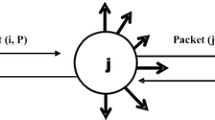Abstract
Wireless Sensor Networks (WSN) organizes sensors for data exchanges with storage resources and limited energy. Recharging or replacement of batteries in mobile sensor nodes are mostly not possible. In WSN, one of the crucial issues is energy consumption. Hence, in this paper, the Trust Based Energy Based Routing (TBEBR) algorithm is used to reduce this energy consumption to increase network lifetime and enhance the security level. Selecting a proper path with a short distance can appropriately lessen energy consumption and enhance network lifetime. This paper aims to find an energy-efficient shortest path routing that makes transmission simple with low energy consumption. This proposed algorithm considers initial energy, residual energy, trust value and reliability as parameters to select the next hop in the routing path. Addition Encouragement Multiplication Punishment (AEMP) model is utilized to make this calculation. Further, the Mixed Integer Linear Programming (MILP) optimization is selected to form a minimized energy-consuming WSN model. These proposed routing protocols are implemented, and results analyzed. Simulation results show that the proposed algorithm has increased throughput by 30%, residual energy by 13% and network lifetime by 15%. Hence, this proposed algorithm hopefully reduced energy consumption than other previously existing routing protocols.
















Similar content being viewed by others
Availability of Data and Material
There is no availability of data or materials available or report for the manuscript.
References
Hung, L. L., Leu, F. Y., Tsai, K. L., & Ko, C. Y. (2020). Energy-efficient cooperative routing scheme for heterogeneous wireless sensor networks. IEEE Access, 8, 56321–56332.
Kang, J., Kim, J., Kim, M., & Sohn, M. (2020). Machine learning- based energy- saving framework for environmental states-adaptive wireless sensor networks. IEEE Access, 8, 69359–69367.
Foully, F. H. E. L., & Ramadan, R. A. (2020). E3AF: Energy efficient environment- aware fusion based reliable routing in wireless sensor networks. IEEE Access, 8, 112145–112159.
Wang, Z., Ding, H., Li, B., Bao, L., & Yang, Z. (2020). An energy efficient routing protocol based on improved artificial bee colony algorithm for wireless sensor networks. IEEE Access, 8, 133577–133596.
Yarinezhad, R., & Hashemi, S. N. (2019). Solving the load balanced clustering and routing problems in WSNs with an fpt-approximation algorithm and a grid structure. Pervasive and Mobile Computing, 58, 101033.
Singh, R., & Verma, A. K. (2017). Energy efficient cross layer based adaptive threshold routing protocol for WSN. AEU-International Journal of Electronics and Communications, 72, 166–173.
Seyyedabbasi, A., Kiani, F. (2020). MAP-ACO: An efficient protocol for multi-agent pathfinding in real-time WSN and decentralized IoT systems. Microprocessors and Microsystems, 103325.
Nivedhitha, V., Saminathan, A. G., & Thirumurugan, P. (2020). DMEERP: A dynamic multi-hop energy efficient routing protocol for WSN. Microprocessors and Microsystems, 79, 103291.
Kang, J., Kim, J., Kim, M., & Sohn, M. (2020). Machine learning-based energy-saving framework for environmental states-adaptive wireless sensor network. IEEE Access, 8, 69359–69367.
Hameed, A. R., ul Islam, S., Raza, M., Khattak, H. A. (2020). Towards energy and performance aware geographic routing for IoT enabled sensor networks. Computers & Electrical Engineering, 85, 106643.
Mohaisen, L. F., & Joiner, L. L. (2017). Interference aware bandwidth estimation for load balancing in EMHR-energy based with mobility concerns hybrid routing protocol for VANET-WSN communication. Ad Hoc Networks, 66, 1–15.
Singh, A., & Nagaraju, A. (2020). Low latency and energy efficient routing-aware network coding-based data transmission in multi-hop and multi-sink WSN. Ad Hoc Networks, 107, 102182.
Adil, M., Khan, R., Almaiah, M. A., Binsawad, M., Ali, J., Al Saaidah, A., & Ta, Q. T. H. (2020). An efficient load balancing scheme of energy gauge nodes to maximize the lifespan of constraint-oriented networks. IEEE Access, 8, 148510–148527.
Ahmed, A. M., & Paulus, R. (2017). Congestion detection technique for multipath routing and load balancing in WSN. Wireless Networks, 23(3), 881–888.
Elsmany, E. F. A., Omar, M. A., Wan, T. C., & Altahir, A. A. (2019). EESRA: Energy efficient scalable routing algorithm for wireless sensor networks. IEEE Access, 7, 96974–96983.
Bhardwaj, R., & Kumar, D. (2019). MOFPL: Multi-objective fractional particle lion algorithm for the energy aware routing in the WSN. Pervasive and Mobile Computing, 58, 101029.
Allam, A. H., Taha, M. Zayed, H. H. (2019). Enhanced zone-based energy aware data collection protocol for WSNs (E-ZEAL). Journal of King Saud University-Computer and Information Sciences.
Kalidoss, T., Rajasekaran, L., Kanagasabai, K., Sannasi, G., & Kannan, A. (2020). QoS aware trust based routing algorithm for wireless sensor networks. Wireless Personal Communications, 110(4), 1637–1658.
Bangotra, D. K., Singh, Y., Selwal, A., Kumar, N. Singh, P. K. (2021). A trust based secure intelligent opportunistic routing protocol for wireless sensor networks. Wireless Personal Communications, 1–22.
Inga, E., Inga, J., & Ortega, A. (2021). Novel approach sizing and routing of wireless sensor networks for applications in smart cities. Sensors, 21(14), 4692.
Zhao, T., Wang, L., Chin, K. W., & Yang, C. (2020). Routing in energy harvesting wireless sensor networks with dual alternative batteries. IEEE Systems Journal.
Funding
There is no funding provided to prepare the manuscript.
Author information
Authors and Affiliations
Contributions
The corresponding author claims the major contribution of the paper including formulation, analysis and editing. The Second author provides guidance to verify the analysis result and manuscript editing.
Corresponding author
Ethics declarations
Conflict of interest
There is no conflict of Interest between the authors regarding the manuscript preparation and submission.
Ethical Approval
This article does not contain any studies with human participants or animals performed by any of the authors.
Informed Consent
Informed consent was obtained from all individual participants included in the study.
Additional information
Publisher's Note
Springer Nature remains neutral with regard to jurisdictional claims in published maps and institutional affiliations.
Rights and permissions
About this article
Cite this article
Renuga Devi, R., Sethukarasi, T. Develop Trust-Based Energy Routing Protocol for Energy Efficient with Secure Transmission. Wireless Pers Commun 123, 2835–2862 (2022). https://doi.org/10.1007/s11277-021-09266-6
Accepted:
Published:
Issue Date:
DOI: https://doi.org/10.1007/s11277-021-09266-6




